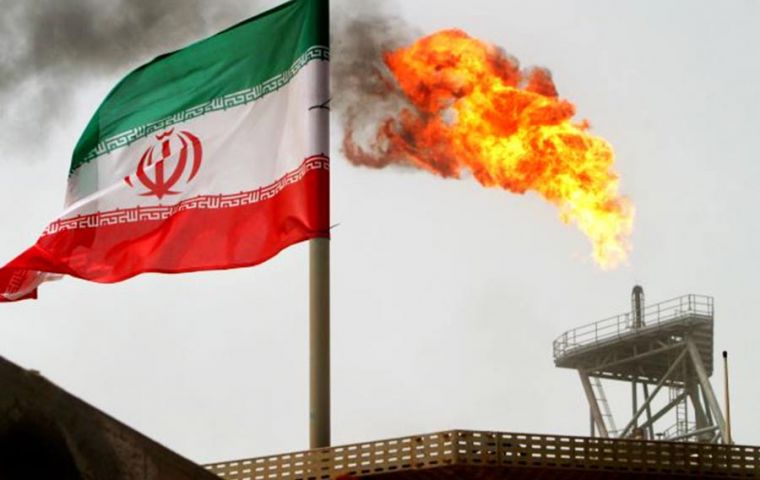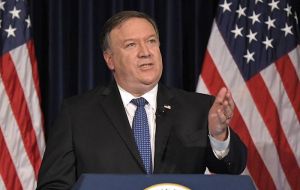MercoPress. South Atlantic News Agency
US threatens sanctions on countries that continue to purchase Iranian oil: crude hits six month highs
 The Trump administration on Monday said it will not renew exemptions granted last year to some eight buyers of Iranian oil
The Trump administration on Monday said it will not renew exemptions granted last year to some eight buyers of Iranian oil  US re-imposed sanctions in November on exports of Iranian oil after president Trump unilaterally pulled out of a 2015 to curb Tehran's nuclear program.
US re-imposed sanctions in November on exports of Iranian oil after president Trump unilaterally pulled out of a 2015 to curb Tehran's nuclear program.  Iran's oil exports have dropped to about one million barrels per day (bpd) from more than 2.5 million bpd prior to the re-imposition of sanctions.
Iran's oil exports have dropped to about one million barrels per day (bpd) from more than 2.5 million bpd prior to the re-imposition of sanctions.  The White House intends to deprive Iran of its lifeline of US$50 billion in annual oil revenues, Pompeo said, as it pressures Tehran to curtail its nuclear program
The White House intends to deprive Iran of its lifeline of US$50 billion in annual oil revenues, Pompeo said, as it pressures Tehran to curtail its nuclear program The United States on Monday demanded that buyers of Iranian oil stop purchases by May 1 or face sanctions, a move to choke off Tehran's oil revenues which sent crude prices to six-month highs on fears of a potential supply crunch.
The Trump administration on Monday said it will not renew exemptions granted last year to some eight buyers of Iranian oil, a more stringent than expected decision that caught several key importers who have been pleading with Washington to continue buying Iranian oil sanctions-free.
The United States re-imposed sanctions in November on exports of Iranian oil after US President Donald Trump last spring unilaterally pulled out of a 2015 accord between Iran and six world powers to curb Tehran's nuclear program.
Eight economies, including China and India, were granted waivers for six months, and several had expected those exemptions to be renewed.
Tehran remained defiant, saying it was prepared for the end of waivers, while the Revolutionary Guards repeated a threat to close the Strait of Hormuz, a major oil shipment channel in the Gulf, Iranian media reported.
The White House said it was working with top oil exporters Saudi Arabia and the United Arab Emirates to ensure the market was “adequately supplied.”
Traders, already fretting about tight supplies, raised skepticism about whether this more stringent approach, along with ongoing sanctions on Venezuela's oil industry, could backfire in the form of a major spike in prices.
“It is a surprise that the requirement to cease importing Iranian oil should come at this next May deadline,” said Elizabeth Rosenberg, director of the energy, economics and security program at Washington-based Center for a New American Security.
“Having only several weeks’ notice before the deadline means there are lots of cargoes booked for May delivery. This means that it will now be harder to get it out by the deadline.”
Iran's oil exports have dropped to about one million barrels per day (bpd) from more than 2.5 million bpd prior to the re-imposition of sanctions.
US Secretary of State Mike Pompeo, in a briefing on Monday, said “we're going to zero across the board,” saying the United States had no plans for a grace period for compliance beyond May 1.
The White House intends to deprive Iran of its lifeline of US$50 billion in annual oil revenues, Pompeo said, as it pressures Tehran to curtail its nuclear program, ballistic missile tests and support for conflicts in Syria and Yemen.
A senior administration official said President Donald Trump was confident Saudi Arabia and the United Arab Emirates will fulfill their pledges to compensate for the shortfall in the oil market.
US Assistant Secretary of State for Energy Resources Frank Fannon said Riyadh was taking “active steps” to ensure global oil markets were well supplied.
Saudi Arabian Energy Minister Khalid al-Falih, in a statement on Monday, did not commit to raising production, saying it was “monitoring the oil market developments” after the US statement, and that it would coordinate with other oil producers to ensure a balanced market. OPEC is next scheduled to meet in June.
While Saudi Arabia is expected to boost output again, analysts fear the US move - along with sanctions on Venezuela - will leave the world with inadequate spare capacity.
The international Brent crude oil benchmark rose to more than US$74 a barrel on Monday, the highest since November, due to the uncertainty surrounding increased supply from Saudi Arabia and other OPEC nations, while US prices hit a peak of US$65.92 a barrel, the highest since October 2018.
“Despite high and fast-rising oil prices and high geopolitical disruption risk, (Trump) is betting the farm that Saudi Arabia and the UAE will contain upward price pressure by more than offsetting Iranian oil,“ said Robert McNally, president of Rapidan Energy Group, an energy consultancy.
In addition to China and India, the economies of Japan, South Korea, Taiwan, Turkey, Italy and Greece had also been granted waivers.
Trump has been clear to his national security team in recent weeks he wants the waivers to end and national security adviser John Bolton has been working on that within the administration.
In recent months, Saudi Arabia and other OPEC members have cut supply dramatically. OPEC, along with ally Russia and others, agreed to reduce output by 1.2 million bpd, but they have exceeded those benchmarks, with Saudi Arabia alone reducing supply by 800,000 bpd.
While Italy, Greece and Taiwan already have halted purchases, doing so could prove much more challenging for China and India. Turkey, another buyer, already has slammed the US decision.
”We had indicated privately that zero was coming and now we're here,” a senior administration official said on Monday, referencing Turkey's concerns.
Geng Shuang, a Chinese Foreign Ministry spokesman, said at a daily news briefing in Beijing on Monday that it opposed unilateral US sanctions against Iran and that China's bilateral cooperation with Iran was in accordance with the law.




Top Comments
Disclaimer & comment rulesCommenting for this story is now closed.
If you have a Facebook account, become a fan and comment on our Facebook Page!